Glamis Castle ghosts haunt the halls and rooms of the Scottish stately home, says guest writer KEITH COLEMAN
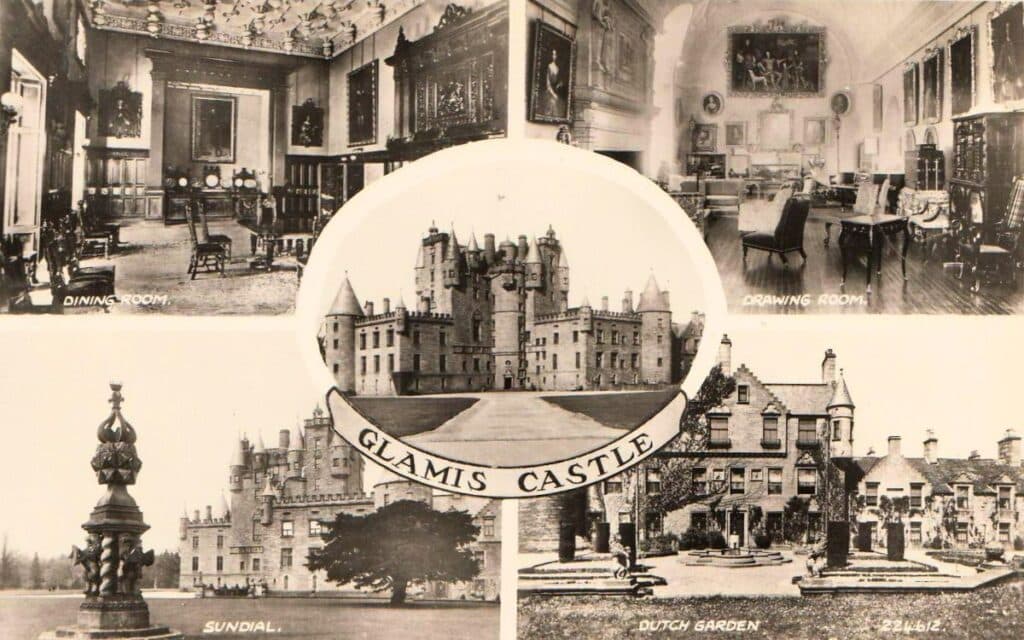
1. Satan’s gambling pal Glamis Castle Earl Beardie didn’t die there
Alexander Lindsay, 4th Earl of Crawford, haunts the castle after his soul was stolen away by Satan there for gambling and cursing.
One of the most notorious spirits who haunt Glamis Castle it is said that he haunts a certain room in the castle and he is sometimes heard stamping and swearing.
A figure in armour is also reckoned by some to be the ghost of Crawford (who was also known as the Tiger Earl because of his fierceness).
Beardie’s connection with Glamis Castle is strange, since the castle did not belong to him, but to the Lyon family (who later became the Bowes-Lyons and Earls of Kinghorn).
Crawford’s home was really at nearby Finavon Castle, where he died, and he was buried in the city of Dundee.
Also, though the ghost of Beardie is sometimes said to be a huge old man, he died of fever at the age of 30.
The Lindsay and the Lyon families were on friendly terms in the 15th century, so he may well have visited Glamis, but that wasn’t always the case.
The very first Lyon who lived at Glamis, Sir John Lyon, was killed by Sir David Lindsay of Crawford in a duel in the late 14th century.
2. There are at least nine ghosts at Glamis Castle
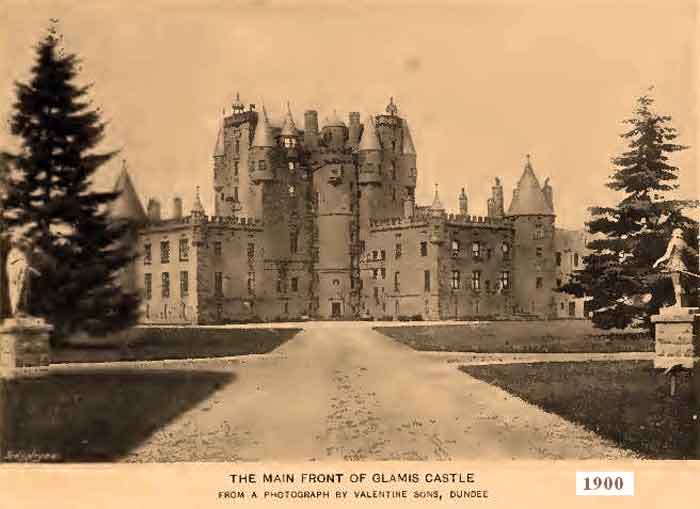
Well, some ‘experts’ say there are.
But if that makes the castle the most haunted place of residence in Scotland is also open to question.
No-one, however, has done a spectral head count in recent years, and how would you go about conducting such a survey?
The most famous ghosts are The Monster of Glamis,a long-lived and severely deformed child born into the family who was sometimes seen in the battlements or the grounds, Earl Beardie, The Green Lady, The Grey (or White) Lady, The Tongueless Woman who runs across the lawns, The Hanged Butler, The African Servant Boy who mischievously tries to trip up passers-by outside the Queen Mother’s bedroom…There are almost certainly others lurking within the walls, including King Malcolm II of Scotland who was killed near this spot.
Some people say that Macbeth killed Duncan at Glamis, but although Shakespeare makes the witches foretell that Macbeth will become Thane of Glamis, he probably didn’t have any historical connection with the place.
Those who have spotted either the ghost of Macbeth or Duncan within the ancient castle walls are clearly seeing someone else.
3. The Monster of Glamis story was made into a film
In the early 1950s an American film called ‘The Maze’ was made (released in terrifying 3-D), very loosely based on the legend that there was a monstrous heir born into the Bowes-Lyon family who owned Glamis Castle.
Like many other pulp films of the era, the plot is hardly sophisticated and those looked to strict adherence to the accepted legend, let alone any historical accuracy, had best look elsewhere.
Although the film was based on a book by a Swiss writer, its director, William Cameron Menzies, was Scottish-American and may have known about the haunting of Glamis Castle from his parents, who were from Perthshire, or his time studying at the University of Edinburgh.
The haunted family in the movie are called MacTeam and the ‘monster’ looks something like an overgrown rubbery frog, while the actual haunted house is called Craven Castle.
4. Some of the members of the Glamis family believed in ghosts, others didn’t
Most of the most famous ghosts and legends about the house sprung up in the 19th century and there are various reports about some of the Strathmore family being told about the terrible secret of the Monster and other things.
The usual story is that the Earl of Strathmore and his factor (the manager of the estate) carry the burden of knowing the secret of the Monster of Glamis and that this is told to the heir when he comes of age.
It is said that one of these heirs flatly refused to be let into the terrible family secret at Glamis and it is possible that the secret was lost at that time, during the late Victorian age, when stories about Glamis Castle appeared in countless books and newspaper articles.
During the 20th century the stories dwindled a bit and recently the representatives of Glamis Castle have been keen to play down supernatural associations, being more keen to promote the great house as a venue for weddings and functions.
The Queen Mother’s sister, Lady Granville (1890-1967), firmly believed in the ghosts in her childhood home and saw the Grey Lady in St Michael’s Chapel within the castle.
The 16th Earl of Strathmore, Timothy Bowes-Lyon, also spotted this sad spectre in the same location.

5. Other nearby castles has famous family ghosts
Another castle in Angus which has a resident ghost is nearby Cortachy Castle, home to the Ogilvy family, Earls of Airlie.
This family are haunted by a Drummer Boy, whose ghostly drumming (sometimes accompanied by other music) heralds the death of someone within the family.
The Drummer may have been a messenger from an enemy of the Ogilvys who was murdered by them at the castle.
One version of the story says that the drummer was stuffed inside the drum and thrown from a tower window.
The Drummer was last heard at the turn of the 20th century and there seems to have been no occurrence of his spectral tattoo for over a century.
Another death omen for this family was when it was observed that water in a stream near the castle flowed around a certain stone in the ‘wrong’ direction.
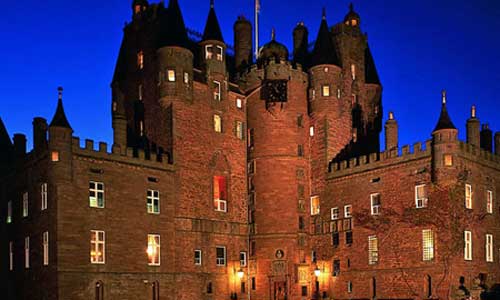
6. The castle was nearly not built because of supernatural interference
A legend says that it was planned to build the castle on a nearby hill.
But every morning when the builders returned to the site they found that the stones were scattered and broken. They rebuilt the walls, but each day the same things happened.
Eventually a supernatural voice warned them: ‘Build not on this enchanted spot, where man hath neither part nor lot, but build down in yonder bog, where it will neither shake nor shog!’
This instruction was followed and Glamis Castle was constructed on the flat terrain where it remains today.
These inhabitants on Hunter’s Hill are thought to be fairy folk, who wanted no human interference on their site.
Another name for this hill is Fierypans, and it is thought that this comes from a time when great ritual fires blazed on the summit.
7. Glamis Castle has many royal connections apart from Macbeth
Ok, Macbeth may not have had much to do with Glamis, but plenty of other Scottish royals were associated with the castle and the area over the centuries.
King Malcolm II of Scotland was probably slain in a minor battle here in the 11th century, though the details of who actually killed him and what occurred and quite sketchy.
There is an old Pictish stone in Glamis village which is supposed to portray scenes about the king’s death, but it was already centuries old by the time he died.
The estate was the possession of Scottish royalty before it was given to the Lyon family in the 14th century.
It reverted to the crown for a brief time in the 16th century after King James V had the Lady Glamis of his time condemned and burned as a witch. Happily, Glamis Castle reverted to its rightful owners.
Both Queen Elizabeth the Queen Mother and her second daughter Princess Margaret were born in the castle.
8. There is a haunted cup in the castle
Careful if you take a drink from the Lion Cup in Glamis Castle.
This silver vessel, is the shape of a lion, holds nearly a whole bottle of wine and visitors were often made to drain the cup in one go before they left the building.
Apart from getting guests very drunk, there is a shadowy tradition that the cup has brought bad luck to the castle and its resident family, though no-one knows where the cup came from or exactly why it has such a sinister reputation.
The writer, Sir Walter Scott, visited Glamis Castle in 1790 and was made to follow the custom of swallowing the contents of the Cup.
He was so befuddled when he left the building that he set off in the wrong direction and had to be put on the right road by a couple of locals.
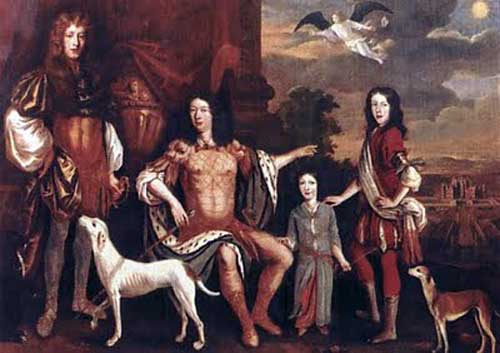
9. The Glamis monster story may be based on truth
One theory is that a severely deformed, though long-lived heir to the Strathmore estates was born in the family in the early 19th century, or even before.
There was no question that the unfortunate child would take its place at the head of the family and eventually inherit its wealth, so it was kept alive and cared for within Glamis Castle, kept in a specially concealed secret room. (And there may be several so-called secret rooms within the castle walls.)
The child grew up and survived to an incredible age.
Sometimes it was exercised within the castle grounds when no-one was nearby; at other times it was allowed to walk on the castle parapets, out of sight.
This may have given rise to the part of the battlements named ‘The Mad Earl’s Walk’. Various researchers insist that the child was Thomas Bowes-Lyon, a son of Thomas, Lord Glamis and his wife (who were the great-great grandparents of the current Queen).
Official records show that this child sadly died on the day which he was born, 21 October 1821, but there are those who say this was not the case.
10. A deadly stream flows near the castle
The River Dean is little more than a burn or stream, but local people called it the ‘Dowie’ Dean, meaning ‘doleful’ or ‘sinister’. A popular rhyme once proclaimed that this river claimed a human life every year: ‘The Dowie Dean, it runs its leane [alone], and ilka year it taks eane’.
Another version says that that it took a life one year, then spared a life the next year.
A third version insisted that the Dean only killed someone by drowning once every seven years, which seems a more modest appetite. Many Scottish waters are haunted by water-kelpies, blood thirsty spirits in the form of horses.
The River Dean did not have one of these, as far as we know, but the broad valley of Strathmore which it runs through certainly had other rivers which demanded sacrifice, the most renowned of which is the River Ericht, several miles to the west of Glamis Castle.
What are Glamis Castle’s horrible secrets?
ROSIE McCLUNE goes into the shadows to seek the horrible secrets of Scotland’s Glamis Castle!
(Article originally published on Spooky Isles in 26 January 2013)
When you hear or tell stories of Scottish castles, myths and legends, there is little doubt that Glamis Castle will be amongst them.
Located in the village of Glamis in Angus, Scotland, the castle is dripping in history and tales of murder, monsters, ghosts and devilish card games. It is thought to be the most haunted castle in Scotland.
The castle was originally built in the 14th Century, though the present building has stood since the 17th century and is the home of the Lyon/Bowes-Lyon family to the present day.
Elizabeth Bowes-Lyon was born there in 1900, who later became Queen Elizabeth the Queen Mother, and she spent much of her childhood at Glamis, even when it was being used as a hospital in the First World War.
Glamis is also the home of the main protagonist of one of Shakespeare’s greatest and darkest tragedies, the play Macbeth. It is unknown if Shakespeare ever visited Glamis, however, it does provide a perfect background to the castles’ dark history.
Earl Beardie
One of the most famous legends of the castle is the one of “Earl Beardie”, thought to be the 4th Earl of Crawford.
he story goes that Beardie on a Saturday night, was playing cards with a friend and as the clock neared midnight, a servant warned them that playing cards on the Sabbath was sacrilege. Beardie wanted to continue playing, so he said that he would play with “the very devil himself”.
On the stroke of midnight, a tall man dressed in black walked into the room who Beardie had never seen before and asked if he still needed a playing partner. Beardie agreed to the wager which was for a handful of rubies.
The man sat down, then a short time later, the servant heard commotion coming from the room. The servant entered the room and saw Beardie had been engulfed in flames.
The legend goes that the tall man was actually the Devil himself, and Beardies’ soul was condemned to play cards until Doomsday for playing on the Sabbath.
Sounds of feet angrily stomping and loud swearing still allegedly come from the high up room in the West Tower where Beardie played cards with the Devil.
The Grey Lady
Another ghost said to haunt Glamis Castle is that of Janet Douglas. A beautiful young woman, she was married to the 6th Lord of Glamis and after his death, she was arrested for witchcraft and conspiracy to poison the King, by King James V who despised the family Douglas (in particular her brother) and condemned her to death.
She was kept in a dungeon for years then burned alive at Edinburgh castle.
After the execution which she endured with grace and dignity, her ghost has been seen kneeling, praying at the altar of the chapel in Glamis Castle and has become known as the “Grey Lady”.
There are few who thought her guilty of the crimes she was charged with. There is one seat in the chapel that is still reserved for Lady Janet and although family functions still occur regularly in the chapel, no-one is allowed to sit in the seat reserved for Lady Janet.
The Glamis Monster

There are several tales of a Glamis “monster'”, which involves a hidden room and a hideous monster which resides in it. Although, it is a macabre tale of a badly-deformed child, thought to be the son of the 11th Earl of Strathmore born in 1821. So severe were the deformities, they registered the child as dead and locked him away in a secret room, not expecting him to live beyond infancy. However, the child grew to be an enormous man of great strength and lived for near a century.
When any men in the family turned 21, they were offered the chance to see the secret horror of Glamis Castle and see the secret room and what it held. Some of the men refused, afraid of going insane.
There is another story of guests staying at the castle who were seeking out the secret room and decided to hang towels from the windows of rooms they could get into. On going outside to look, many of the windows did not have towels hanging from them. The ghost of the Monster apparently roams the “Mad Earls’ Walk” on the roof of the castle.
ROSIE McCLUNE is a Scottish musician who has a lifelong obsession with the paranormal, horror films and chocolate.
Have you been to Glamis Castle? Did you see a ghost? Tell us about your experience in the comments section below!


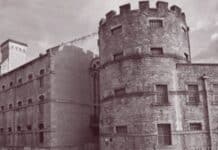



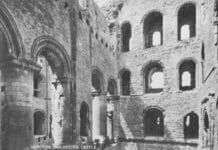

I really appreciated and enjoyed your stories of the ghosts of Glamis castle, very interesting, thank you so much, JB